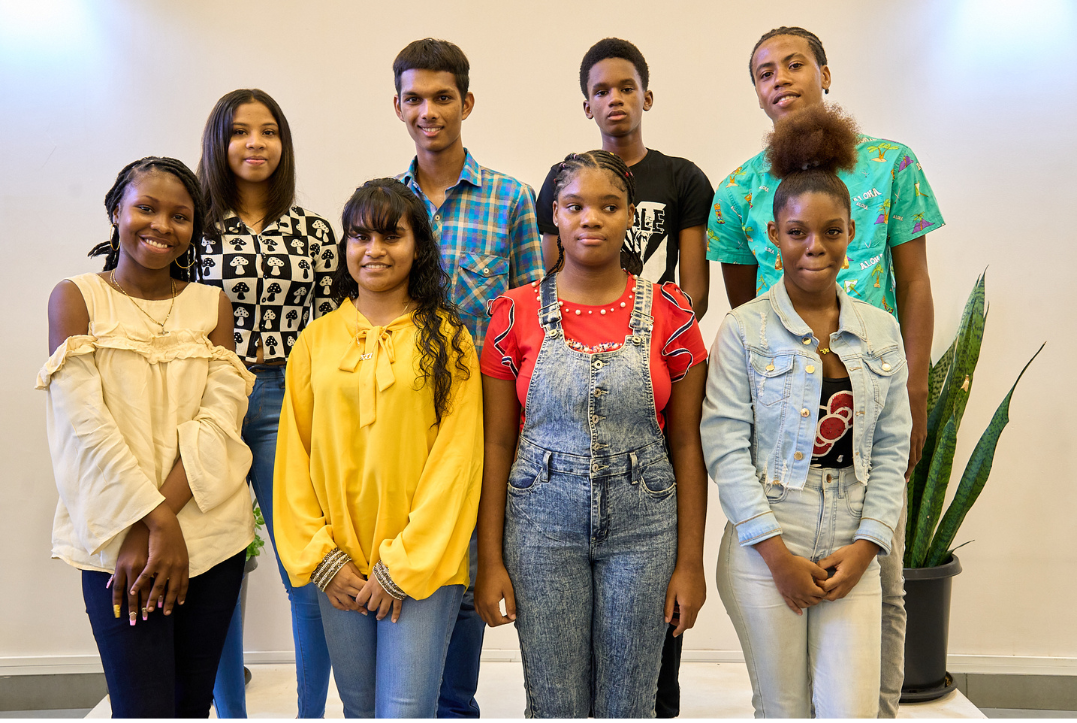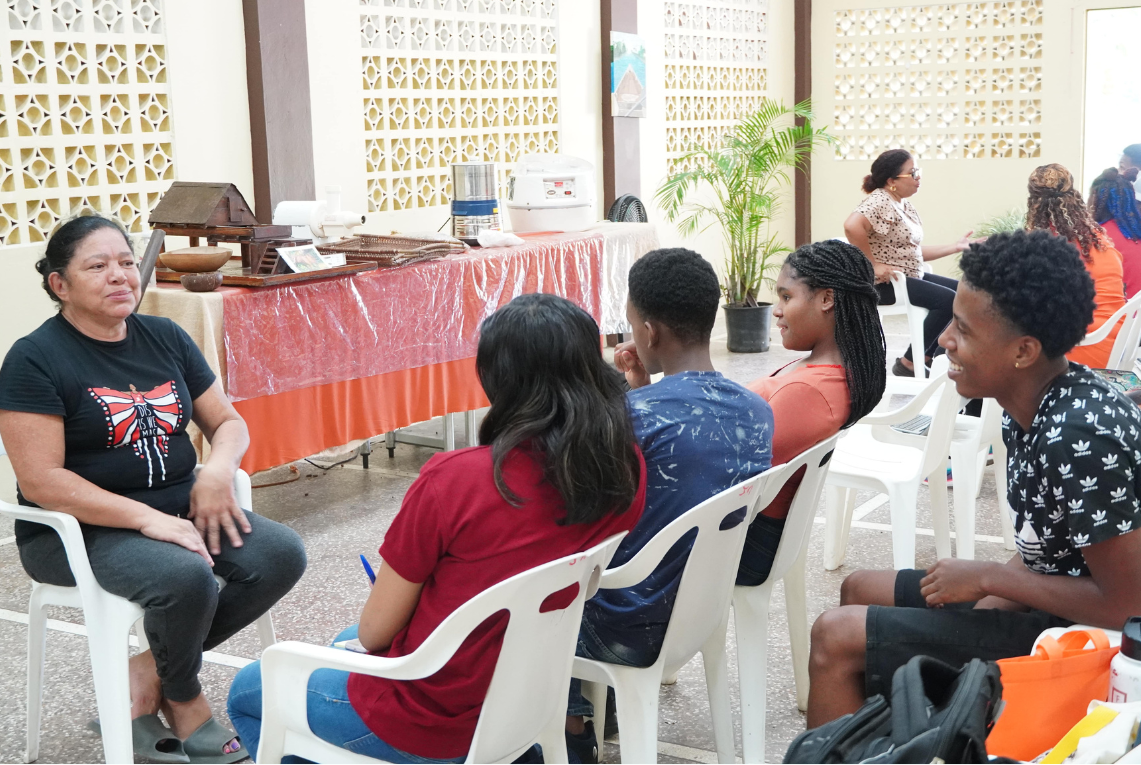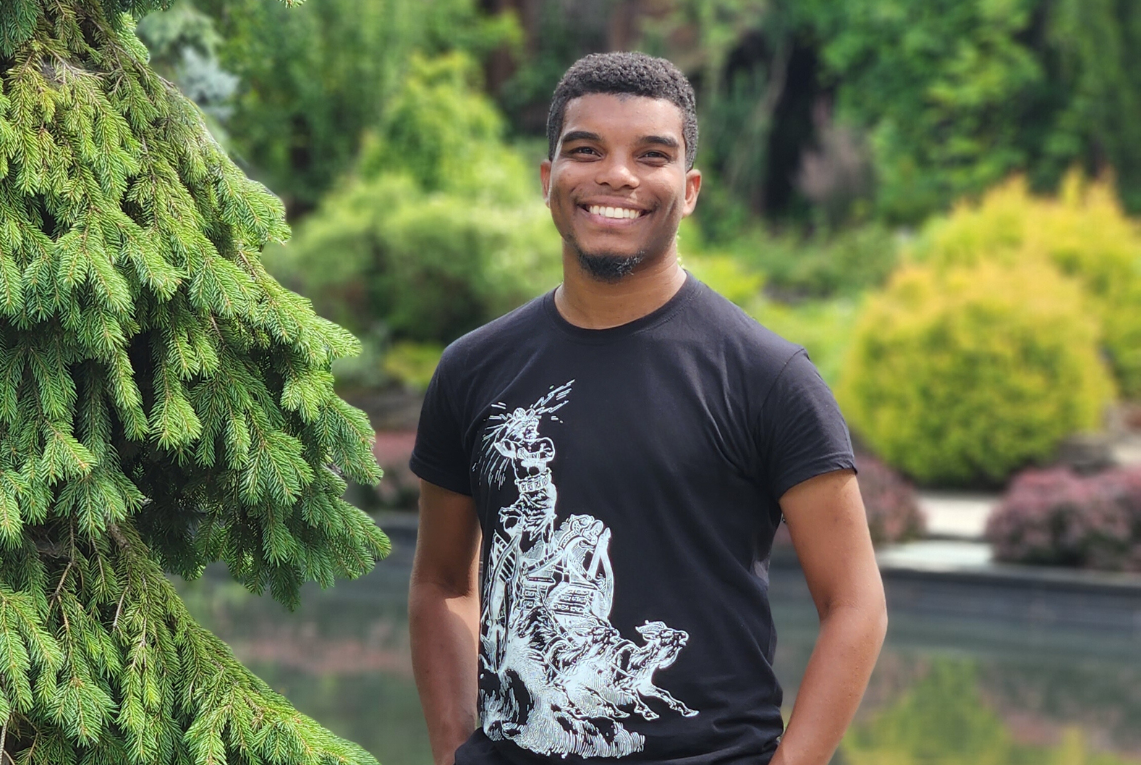The Caribbean nation of Trinidad and Tobago is among the countries particularly vulnerable to climate change. Phenomena such as rising sea levels, changes in rainfall patterns, flooding and the increasing ferocity of storms threaten not only the land, but the lives of its inhabitants.
With more than 70 percent of Trinidad and Tobago's population and 81 percent of its economic activity concentrated in coastal areas, recent natural disasters have displaced thousands of people and caused millions of dollars in damage, according to the dual-island nation’s Ministry of Planning and Development.
Faced with this reality, a group of 20 teenagers from the country are training to become citizen reporters to address the threats that climate change poses to their communities.

In 2023, the first edition of the Youth Journalism Program trained eight high school students. (Photo: Courtesy of Cari-Bois)
The organization Cari-Bois Environmental News Network launched the second edition of its Youth Journalism Program on Sept. 21. According to the organization, the initiative seeks to train “a cohort of environmentally aware and climate conscious Gen Z multimedia journalists.”
Cari-Bois, an environmental content platform powered by a network of citizen journalists from communities, academia and civil society, was created in 2020 by the Cropper Foundation, a Trinidad non-profit that works to promote sustainable development, equity and environmental management in the Caribbean.
In 2023, the first edition of the Youth Journalism Program trained eight high school students. For this edition, the program will train a total of 20 young people between 14 and 15 years old from various parts of the country.
“We will be exposing students to the fundamentals of journalism, and to the importance of environmental journalism,” Tyrell Gittens, Cari-Bois coordinator, told LatAm Journalism Review (LJR). “They will be learning from professional journalists locally as well as internationally so they can understand the importance of environmental journalism and climate journalism.”
The Youth Journalism Program's class of 2023 produced eight articles on different ways climate change is affecting their rural communities, with topics ranging from populations displaced by flooding to the impact of extreme heat on local farmers.
But this program is just one of Cari-Bois’ efforts to fill what it sees as a void of local journalism focused on environmental issues both in Trinidad and Tobago and the rest of the Caribbean.
Cari-Bois began as a citizen journalism project, involving civil society organizations throughout Trinidad and Tobago to train residents to recognize the environmental problems around them and to report on how these problems affected their communities.
Gittens said that, despite the looming climate emergency, the mainstream media in Trinidad and Tobago does not prioritize coverage of environmental issues and climate change. And when they cover it, they do so from a national perspective.
“Particularly for Trinidad and Tobago, the media focuses a lot on politics, crime and different issues like that. But climate journalism and environmental journalism is really something that is now emerging into the public consciousness,” Gittens said. “Given that there was a gap in terms of environmental reporting, the Cropper Foundation had seen the need to get communities involved at that level, and to really inspire people to tell stories themselves accurately, sharing truthful, factual information.”
Between 2020 and 2022, members of environmental NGOs and volunteers from academic institutions also received training on basic concepts of journalism and storytelling to add to the coverage from their own perspectives. Thanks to initial funding from the European Union, Cari-Bois provided participants with technical equipment, such as computers, cameras and microphones.
In those two years, a total of 33 adults were trained, who together published more than 100 articles on the Cari-Bois site, with topics such as climate change, agriculture, pollution, mining, oil and natural gas, forestry, fisheries, biodiversity and environmental governance.
“Cari-Bois wants to just continue to contribute to that community reporting at a community level,” Gittens said. “What we also try to do is to be a bridge between scientific institutions and the general public, and communicate that information in a digestible way.”
In January 2023, Cari-Bois became regional, after identifying that other Caribbean countries were facing a similar shortage of community-based environmental coverage. The organization repeated its training formula in Guyana, Antigua and Barbuda, Barbados, Belize, Saint Vincent and the Grenadines and Suriname.
Many of the citizen reporters who collaborate with Cari-Bois have training in areas other than journalism – they’re biologists, veterinarians, lawyers and marketers. The organization's efforts are based on the idea that a citizen reporter does not need a university degree in journalism to raise awareness about the impact of climate change in their community, especially in a region where there are not many journalists who specialize in these issues.

Cari-Bois' Youth Journalism Program 2024 includes two field trips, in which the trainees will report their stories directly with communities in Trinidad and Tobago. (Photo: Courtesy Cari-Bois)
“A lot of countries in the Caribbean don’t have dedicated environmental writers or reporters, or environmental news is still not a mainstream thing,” Gittens said. “We have been trying in some countries to get writers and it has been exceptionally difficult. So, I think there is an opportunity to train writers there because there's clearly a gap that still needs to be filled.”
Gittens, who also writes articles for the platform, graduated in geography and environmental management and later completed a master's degree in biodiversity conservation and sustainable development. However, he has collaborated in the media for more than eight years and said he became a journalist “along the way.”
Ryan Bachoo is one of the journalists who is part of the team of instructors for the Cari-Bois Youth Journalism Program and is a reporter and news anchor at the private channel CNC3 News in Trinidad and Tobago. He said one of the messages he tries to get across to students in the program is that even before they go to college they can learn to communicate their stories like professional journalists do.
“In this era of journalism and this era of living, you don't need to have a degree in journalism, you don't need to be writing for a mainstream newspaper or work for a mainstream television to be practicing storytelling,” Bachoo told LJR. “You may not have journalist as a title, but you can practice journalism through a podcast, or through YouTube videos.”
Bachoo said although there are local media in the Caribbean that cover environmental issues, they do not have the capacity to do so with the consistency and rigor that is currently required, when the effects of climate change are directly impacting the lives of the inhabitants.
For this reason, he considers it more necessary than ever for citizens to be the ones to bring these issues to public discussion.
“I think the environmental crisis can no longer be hidden. It's in plain sight affecting people's lives, so even if you're not interested in environmental journalism, even if you're not interested in the environment, it is impacting you on a day-to-day basis,” Bachoo said.
Currently, Cari-Bois has a network of more than 80 contributors around the Caribbean who publish approximately one story per week, not only in the form of articles, but also multimedia products.
The platform is open to receiving article proposals from anyone interested in sharing what is happening in their communities on environmental issues.
According to Gittens, one of Cari-Bois' main challenges is to adequately compensate citizen journalists for their articles. As a nonprofit, Cari-Bois relies on funding from donors as well as fundraising campaigns, so resources aren't always enough to produce as many stories as they would like, he said.
“We want to ensure that we sufficiently compensate people for their time and their talents and so on, so we have been doing a lot of fundraising. It has been positive, but in terms of sustainability of the project, it’s something that we are working on,” Gittens said.
Cari-Bois is also working on the challenge of reaching broader audiences. To do this, they have made alliances with national media to republish their content. The organization has an outreach alliance with the international network of writers, bloggers and digital activists Global Voices.

Tyrell Gittens is Cari-Bois' coordinator and editor. (Photo: Courtesy Cari-Bois)
Gittens said one of Cari-Bois' greatest achievements is the network of collaborators that has formed around community environmental journalism in several Caribbean countries. Carolee Chanona, a contributor from Belize who has been writing for the platform since 2022, agrees. For her, the Cari-Bois network serves to foster relations between Caribbean countries regarding the environmental problems they face.
“We all sort of go through the same challenges when it comes to being a developing nation. So having Belize represented in Cari-Bois was just very important to me,” Chanona told LJR. “Cari-Bois gives not only writers but countries, that platform where all of the news is accessible to others. It's important that we're all on sort of the same page regionally.”
One of the key messages that Cari-Bois intends to convey to the participants of its Youth Journalism Program is that, although the ultimate goal is to raise awareness about the climate emergency, their work as citizen reporters is journalistic work, not that of environmental activists.
“It is important that journalists use the platform to raise awareness, but certainly try to follow that model of being, not neutral, but balanced,” Gittens said. “We want to be very mindful that, yes, we highlight environmental issues, some of which will raise awareness for environmental health. And of course, we may interview activists, but we always want to be mindful of that balance in our reporting.”
Cari-Bois is considered a journalism platform first and foremost, Gittens said, and is recognized as such by the Media Association of Trinidad and Tobago.
Bachoo said that one of the purposes of the training will be to convey the relevance of community journalism in a globalized media ecosystem that seems to overshadow more local perspectives.
“Although you live in a small community, in a small country, in a small Caribbean corner of the world, your story is just as important as the stories that are being told in London, in New York, or in Brussels,” Bachoo said. “My purpose is to reinforce that what is happening in their small community impacts people, and that is as important as any other story that an international network is telling.”